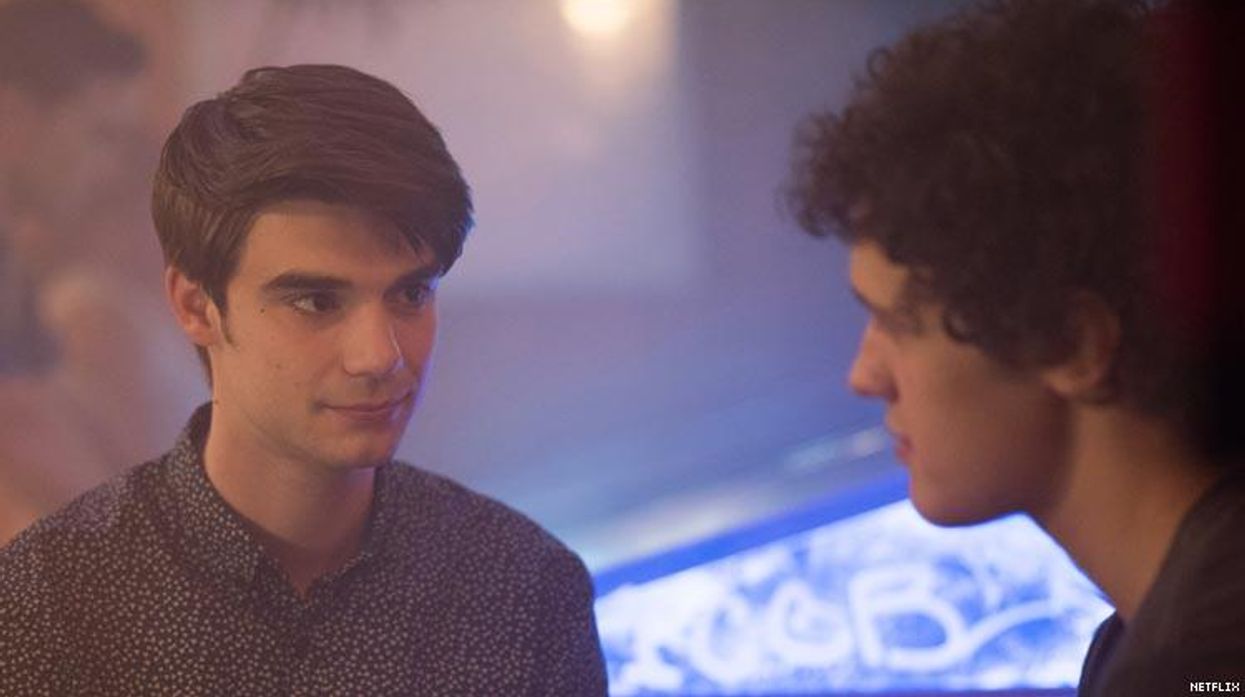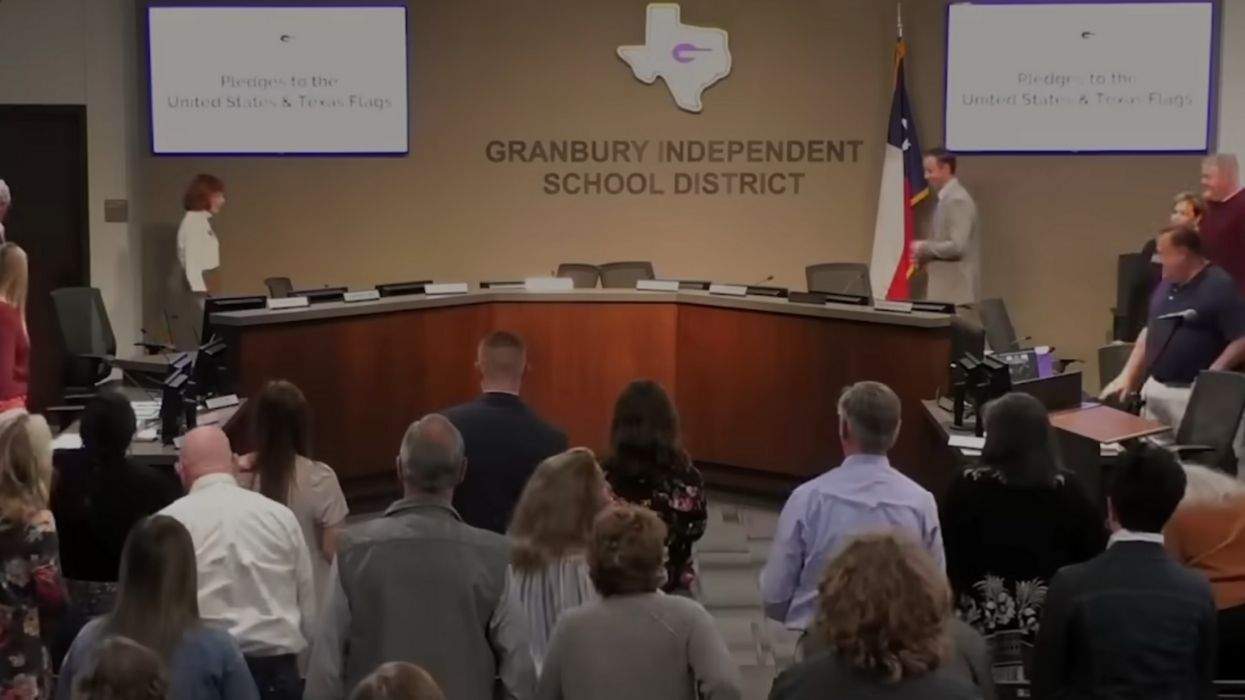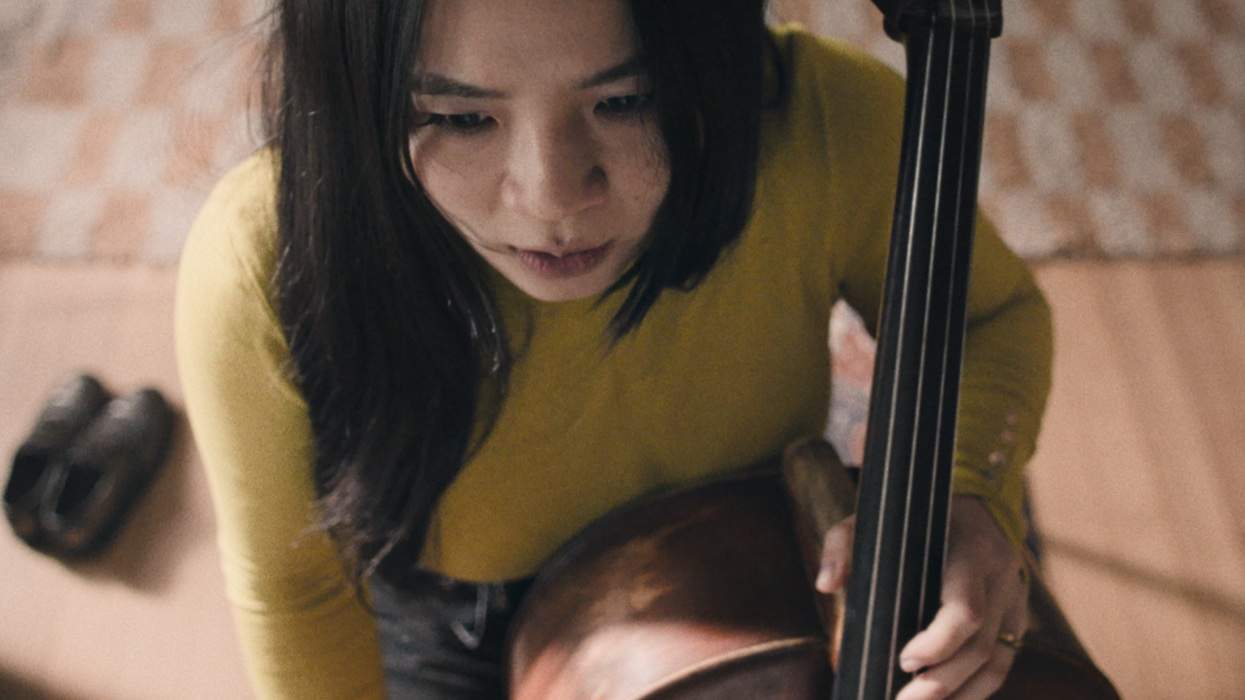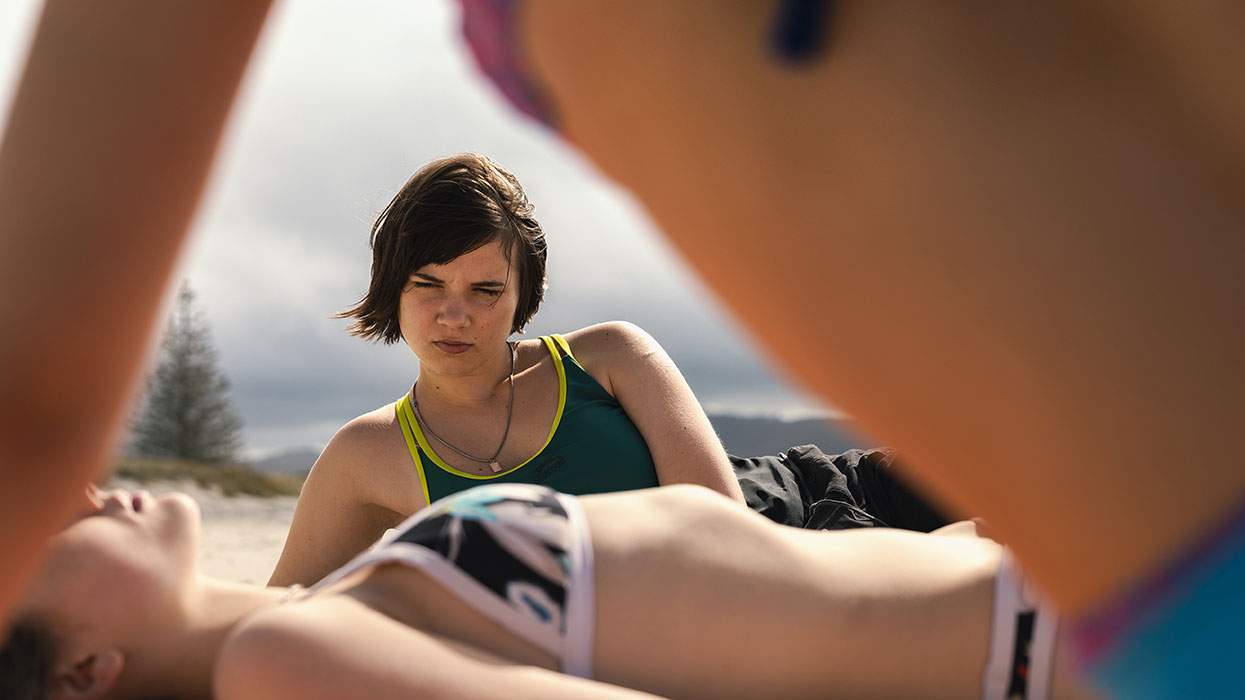Alex Strangelove was a labor of love for its director and writer, Craig Johnson
The gay filmmaker, known for his indie darling The Skeleton Twins, had grown up admiring the oeuvre of John Hughes -- films like Pretty in Pink, Ferris Bueller's Day Off, and The Breakfast Club, which were "treating teenagers as real people." For the first time, their lives (and sex lives) could be seen on the big screen in a comedic light.
However, Johnson noticed that gay characters were nearly absent from the teen comedy genre. Even more modern entries like American Pie and Superbad tended to treat queer people as a punch line. While queer coming-of-age stories existed, they often had a tragic bent. So Johnson set out to make an inclusive comedy that would fill that space.
"I wanted to do something that reminded me of the bright, colorful high school movies that John Hughes used to do. And I also thought it could just be something really funny too. I felt like I hadn't seen that before," he said.
And so the premise for Alex Strangelove was born. In the film, Alex Truelove (Daniel Doheny) is a senior in high school who has made an agreement with his girlfriend (and best friend), Claire (Madeline Weinstein, excellent), to have sex before graduation. As the agreed-upon date of the act approaches, however, Truelove begins to question his sexuality -- particularly after meeting the handsome Elliott (Antonio Marziale).
Johnson put much of his own life story into this narrative. Like Truelove, he dated women in high school and throughout his 20s. He essentially "crammed" his journey of self-discovery "into one kid's senior year of high school." It's a journey he believes that many other gay men share.
"I was still holding that little flame that 'I just haven't met the right girl,'" Johnson recounts of his questioning period. "I did have all these close relationships with women, as many gay men do. And some of them were really truly emotional, and that can be legitimately confusing ... even though it was very, very clear where my sexual energy was directed."
"I would go hook up with a guy and then convinced myself that I had gotten that out of my system. And now it's time to really focus on a relationship with a woman. And spoiler alert! It didn't end up working out with a woman," he joked.
There are many other overlaps with Johnson's life that are referenced on-screen in the Netflix comedy. During a comedic moment, the young protagonist, while wrestling with his identity, hallucinates three boxes of cereal, "Heter'O's," "Gay-Flakes," or "Bi-Crunchies," sitting on the counter in front of him. He briefly wonders if he might be bisexual.
Johnson came out as bisexual when he was 21, before he was certain about his gay identity. By his 30th birthday, however, he had realized his true place on the Kinsey scale. "I had that come-to-Jesus moment with myself, really just in front of the mirror, you know. I had to look at myself and say, 'You know what, kid? Oh, there's a word for you, and it ain't bisexual. It starts with the letter g and ends with y."
Johnson believes younger viewers, who have grown up in a world that is more accepting of LGBT people and have embraced a spectrum of identities beyond "gay," will also identify with the identity-torn Truelove. Johnson was first inspired to make the film, in part, by attending a concert of the gay singer Mika around 10 years ago, and being floored by large groups of young people there who were openly queer. The ecosystem of Truelove's high school reflects this post-LGBT mindset.
"Alex in the movie goes to a high school that is fairly progressive," Johnson said. "There's gay kids, there's bi kids, there's genderqueer kids, there's pansexual kids, there's everything in between -- lesbian, trans. And while that's exciting, on one hand, it doesn't necessarily make sex and dating any easier. In some ways it kind of makes it harder because there are so many choices and it's like, 'OK, I can date anyone I want.'"
Yet Johnson sees Alex Strangelove as a film that has value for all viewers. "I think there's some universal appeal to it in ... how confusing sex is when you're in high school, regardless of your orientation. Love and dating is hard in high school. I think that's relatable to everyone."
"All of us -- gay straight, everything in between -- [had a] first sexual encounter or a moment where we lost our virginity. Chances are it was awkward, no matter who you are," he added. "I think that American films often can shy away from teenage sexuality, and they can be a little prudish. And I just wanted to go there. I wanted to specifically explore what happens when you have utter emotional love for somebody, but for some reason, the sex is just not quite working out."
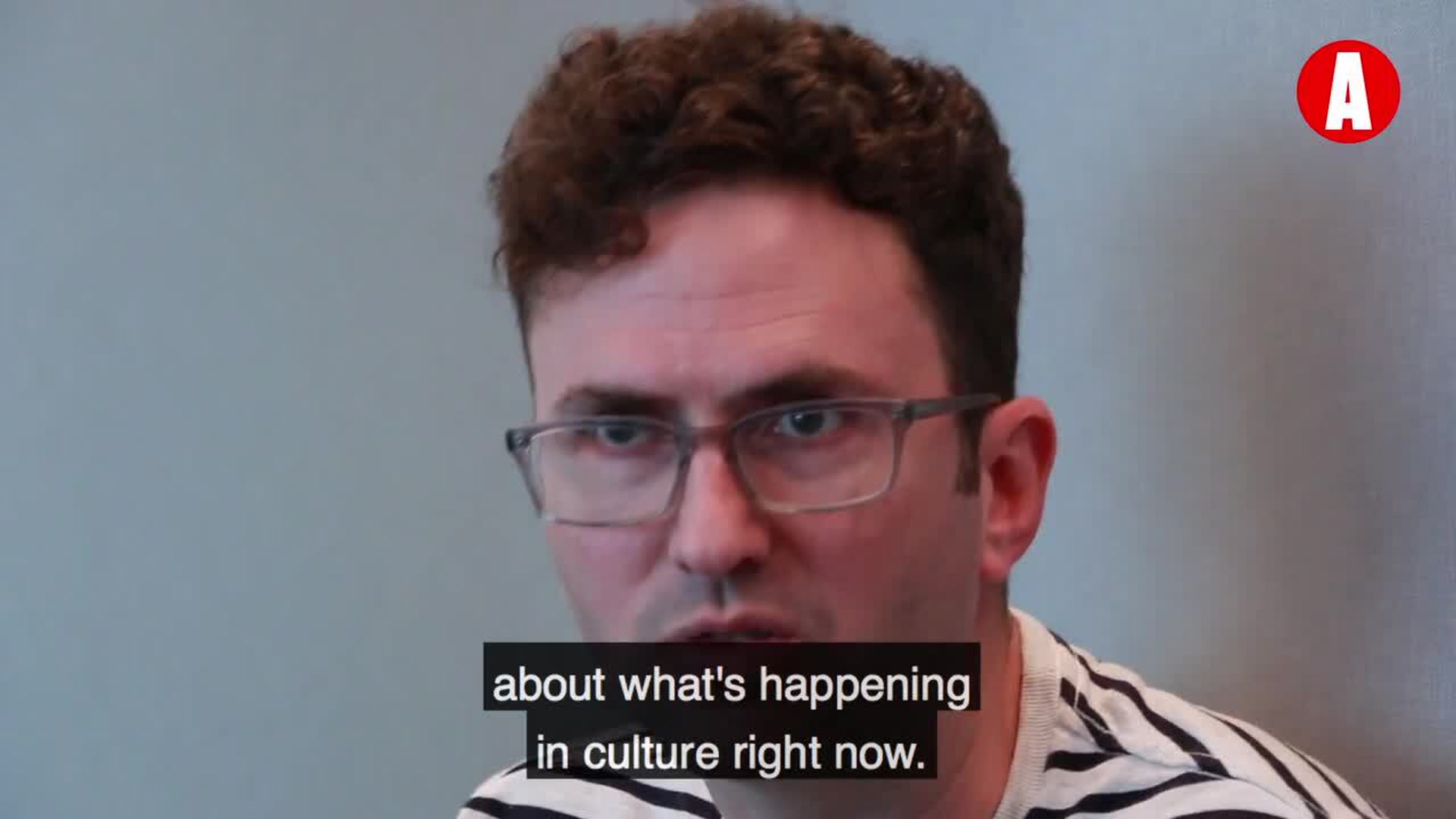
Alex Strangelove, which is produced by Ben Stiller, checks many boxes of the high school losing-my-virginity comedy. Truelove has a team of goofy but loyal friends, among them Daniel Zolghadri (Eighth Grade) and out actor Nik Dodani (Atypical, Murphy Brown). Their exploits include toad-licking, crashing a college party, and preparing for that great teen movie trope: prom night.
For Johnson, it was important to include prom in his film because it is "the one night where your feelings of love and romance and sex are sanctioned by the larger society." By having queer characters placed in the center of this environment, Johnson turns the trope on its head. As a result, he created a Pretty in Pink moment for queer viewers, like the one he had wanted to see in his own youth. It is his contribution to the teen movie canon. "There's no point in doing it if you're not taking it to another level or twisting it or veering left when you should be veering right and giving it a new flavor," said Johnson, who is proud to have queered the genre.
Another film released this year, Love, Simon, also sought to capture the coming-of-age experience of a gay teen. The films had been made at around the same time -- and Johnson initially worried that they would be too similar to one another. But a viewing of the Greg Berlanti-directed film assuaged his fears. He realized that, as an unrated film released by Netflix, Alex Strangelove had far fewer boundaries than Love, Simon, which was constrained since it had to appeal to a theatrical audience in wide release, while keeping its PG-13 rating.
"I really enjoyed it," said Johnson of Love, Simon. "It was very sweet and heartfelt and earnest. When I saw it, I kind of breathed a sigh of relief, because I realized, while we share some DNA, we were also very different. We are basically Love, Simon with sex, drugs, and rock and roll. We're a little bit more of the edgy older brother to Love Simon."
Yet as different as the films are, there are some surface similarities. Both feature a white middle-class gay teen portrayed by a straight actor. Love, Simon sparked some backlash for how it centered the queer experience on this point of view, while sidelining gender-nonconforming characters and characters of color.
When asked how he would respond to similar criticism, Johnson praised the "diverse world" that Truelove inhabits, including his immediate circle of friends. But he also encouraged critics to "air your grievances. I'm here to be part of that conversation. That's part of it for me. If people are engaging with the movie in that way? Hey, maybe that just means that we've made a little bit of a mark on the culture. And so that maybe is something to be proud of."
As for the casting of the three white leads? "Diversity will be a factor in my decision," said Johnson. "But I'm always just looking for who is the right actor for the role. And I'm very proud of the casting in this because I feel like everyone embraces their character in a wonderful way."
Beyond sparking cultural conversations, Johnson hopes Alex Strangelove will give viewers three key takeaways. "I hope they're wildly entertained" is the first. "Whether they're gay, straight or anywhere in between, I hope they see themselves reflected in the characters, and perhaps their own high school experience" is the second.
The final takeaway is for straight people -- particular those who don't live in the most LGBT-inclusive places.
"Maybe this [film] might open their eyes a little bit to the fact that, 'Hey, I might go to a high school in rural Wyoming, but maybe that kid who seems like your straight-A, straight-and-narrow kid? Maybe he's got a secret. And maybe I should open my eyes to that and watch what I say [and] watch how I behave.' Because you never know the true identity of people, especially when you're a teenager and still figuring it out."
And being gay? "Maybe it isn't so strange after all."
Alex Strangelove can be streamed today on Netflix and is playing in select theaters.
